Simple Home Remedies for Wheezing
By Dr Anuja Bodhare +2 more

Get,

to manage your symptom
Get your,


4 Cr+ families
benefitted

OTP sent to 9988776655



You’ve successfully subscribed to receive
doctor-approved tips on
Whatsapp

Get ready to feel your best.

Hi There,
Download the PharmEasy App now!!


Register to Avail the Offer
Send OTPBy continuing, you agree with our Privacy Policy and Terms and Conditions

Hi There,
Sign up on PharmEasy now!!
Trusted by 4 crore+ families

OTP sent to 9988776655



You have unlocked 25% off on medicines




Code: NU25
By Dr Anuja Bodhare +2 more
Table of Contents
You might have heard a wind instrument playing; it sounds beautiful, right? But when you hear a similar sound coming from someone’s body, while they breathe, it might be alarming. The shrill whistle or the coarse rattle like sound that we hear on breathing is called wheezing. It can be caused when a part of the air passage is blocked due to conditions like asthma, bronchitis, allergies, etc. Depending on the part of the airway that is blocked, the type of sound that is heard varies. All wheezes are not audible to the human hear some can only be heard using a stethoscope. Generally, wheezing can be heard when we breathe out (exhale), but sometimes it can be heard when we breathe in (inhale) as well1. You might not find a way for how to stop wheezing immediately without consulting a doctor, but there are various home remedies that you can try that may help relieve wheezing.

Did you know?
There is a network of tubes in our body starting from the nose and leading to the lungs called as bronchi. When there is a blockage or obstruction in the smaller tubes (bronchioles) we can hear wheezing. The blockage can be in one of the larger tubes as well. A wide range of medical underlying conditions can cause wheezing, such as1:
Wheezing itself is a symptom of an underlying medical condition that is causing a partial blockage of the airway. A sound comparable to that of a whistle, rattle or like that of a clarinet (a wind instrument) is a wheeze. You can hear it mainly when you breathe out, but sometimes wheezing can be heard even while breathing in1.
There can be several reasons that can case wheezing, therefore the treatment options also range widely. The use of certain naturally occurring substances that can be easily found in our homes can be used as a remedy for the treatment of wheezing. A few of them are as follows.
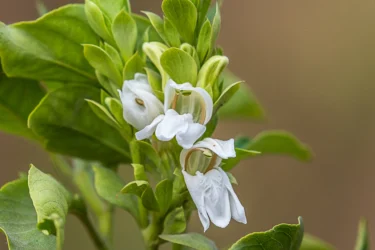
It is also known as Vasa in Sanskrit and Malabar Nut in English. The vasaka leaf decoction/tea helps in widening or opening up of the tubes in the airway and easing breathing. Thus, it is used for treating breathing problems. It is used as a remedy by people for wheezing due to lung issues. The leaves of vasaka can be used to make a decoction and be consumed. To counteract the bitterness, sugar or honey can be added to the decoction2.
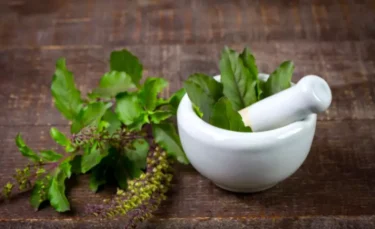
In many Ayurvedic cough syrups, tulsi is a common ingredient. In conditions like bronchitis and asthma, mucus gets stuck in the airway tubes and blocks them partially tulsi helps in moving the mucous, thus clearing the blockage. We can make a decoction using the leaves of tulsi, along with some ginger and honey and enjoy it at the end of a long day. This remedy provides relief in case of bronchitis, influenza, cough, cold and allergies, which may be the reason for wheezing2.
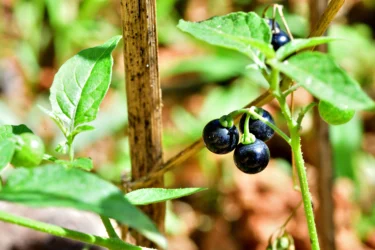
This is also known as Janglibhata in Hindi and Brihati in Sanskrit. In the preparation of cough syrups, it is one of the main ingredients used. It functions by thinning the mucus that is responsible for blocking the airways. Owing to this function, it is helpful when wheezing occurs due to inflammation of bronchus and trachea due to infection by bacteria (bacterial tracheobronchitis)2. It can be used as a remedy by using the leaves of nightshade to make a tea or decoction and drinking it.
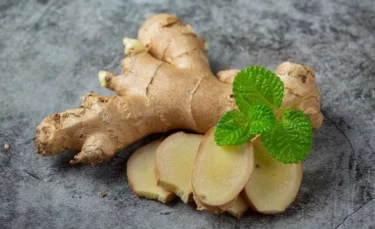
Ginger or adrak is medicinally extremely valuable, especially the rhizome. It is used in reliving many conditions. For the treatment of asthma, a common cause of wheezing, a little bit of ginger juice with pomegranate juice and honey can be consumed. A decoction made by boiling ginger or ginger powder in water and adding honey can be useful in soothing the throat when we have allergies, which is another common cause of wheezing. Thus, ginger can be used in various preparations to relieve wheezing2.
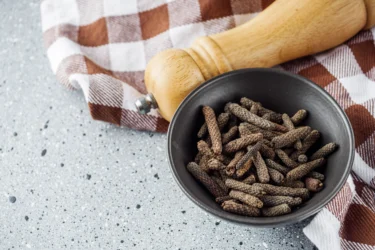
Pipli is the Hindi name of Long Pepper. It is also referred to as Chapla in Sanskrit. The fruit of this tree is of medicinal value. Asthma is a common reason behind wheezing and Pipli can be used to relieve Asthma, thus also an effective wheezing treatment. A little bit of the dried powder of pipli can be consumed along with jaggery. It can be consumed twice in a day, after food, for receiving its beneficial effects2.
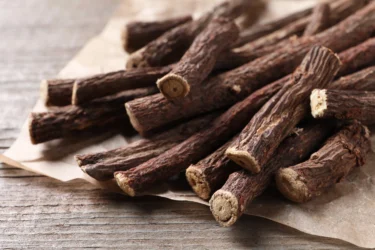
Mulethi is also known as liquorice in English. When wheezing is the cause of bronchial asthma, or due to any other irritation caused in the bronchus, mulethi can be used in the form a tea to relieve it. An herbal tea can be made using mulethi and ginger, this tea can be sipped to feel relief from wheezing. However, it is advised not to drink more than 2-3 cups of this herbal tea in a day2.

Breathing exercises help in expanding the lung and increasing the lung capacity by relaxing our airways. Pranayama is a yoga form of breathing exercises. Practicing Pranayama or any other deep breathing exercises may be helpful in relieving wheezing. It is advised to practise these exercises in a moist environment to gain more benefits1.
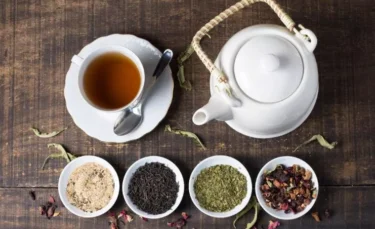
Drinking hot herbal tea provides relief to the throat and helps in relaxing the blocked air passages. This may be due to warmth and moisture of the herbal tea. Green tea is also said to have antibacterial properties, which might have an added advantage. Therefore, drinking hot herbal tea can be a delicious way to overcome your wheezing1.
All these home remedies can be used to limit the severity and control the wheezing, but when there is a severe excerbation it’s always important to take inhalers
Dr. M.G. Kartheeka, MBBS, MD(Pediatrics)
Also Read: How to Avoid Asthma Attacks During Winter
You should contact a doctor if you notice wheezing for the first time, if it keeps returning, or if you notice any of the following:
Wheezing associated with fever and cough should be examined by a physician to diagnose the underlying cause as if left untreated it may be a cause of pneumonia and may cause long-term damage to the lungs in the form of scarring of the airways.
Dr. Ashish Bajaj, M.B.B.S., M.D. in Clinical Pharmacology and Toxicology
Wheezing is an indicator of an underlying medical condition and it is not the kind of music that you want to hear. As there can be a number of reasons responsible for wheezing, it is advisable to consult a doctor and identify its exact cause. It can be due to allergies, cold and cough or can be the indicator of heart diseases as well. It can be uncomfortable and irritating. You can try out ginger, mulethi, tulsi, etc., which might be effective wheezing home remedies. Ensure you do not ignore severe wheezing or symptoms that are worsening and consult a doctor for wheezing treatment.
Also Read: 6 Simple Exercises to Improve Your Lung Health
No. The whistling sound that you hear while breathing is called wheezing and it can occur due to certain underlying conditions like asthma, allergies, bronchitis, etc. when our airway is partly blocked1.
Yes. Wheezing can occur due to allergies, due to blockage of a part of the tubes in the airway. It can also be cause due to bronchitis, smoking, asthma, etc1.
No. There are no reports of wheezing being caused by arthritis.
Yes. Ginger can be used to make a decoction with honey and pomegranate juice, is helpful in reliving asthma and wheezing caused due to it. It can also be used to relieve cough and soothe the throat, which might also relieve wheezing2.
Yes, Brihati is the Sanskrit name for black nightshade. It is beneficial in the treatment of wheezing caused due to inflammation of bronchus and trachea2. We can make use of the leaves of brihati to make a decoction and drink it to gain relief from wheezing.
No. There are no reports of wheezing being caused by kidney disease.
1. Cleveland Clinic. What is wheezing? [Internet]. Clevelanad clinic,ohio. [cited 2022 May 13]. Available from: https://my.clevelandclinic.org/podcasts/health-essentials/simple-ways-to-stop-wheezing
2. Dash Gyanesh , Mohanty KT Kumar Goura Ranjan , Sahoo Diptiman MG and PS. Traditional medicinal plants used for the treatment of asthma in Bhubaneswar, Odisha. Int J Herb Med [Internet]. 2018;12(3):27–40. Available from: https://www.researchgate.net/publication/328630427_Traditional_medicinal_plants_used_for_the_treatment_of_asthma_in_Bhubaneswar_Odisha
Disclaimer: The information provided here is for educational/awareness purposes only and is not intended to be a substitute for medical treatment by a healthcare professional and should not be relied upon to diagnose or treat any medical condition. The reader should consult a registered medical practitioner to determine the appropriateness of the information and before consuming any medication. PharmEasy does not provide any guarantee or warranty (express or implied) regarding the accuracy, adequacy, completeness, legality, reliability or usefulness of the information; and disclaims any liability arising thereof.
Links and product recommendations in the information provided here are advertisements of third-party products available on the website. PharmEasy does not make any representation on the accuracy or suitability of such products/services. Advertisements do not influence the editorial decisions or content. The information in this blog is subject to change without notice. The authors and administrators reserve the right to modify, add, or remove content without notification. It is your responsibility to review this disclaimer regularly for any changes.
Comments

Leave your comment...
You may also like
Comments